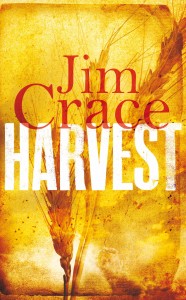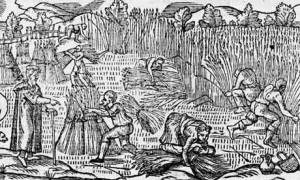
Jim Crace’s novel Harvest was longlisted for the Booker Prize of 2013. Crace is an amazingly taut writer – he does the ‘digested reads‘ in The Guardian, condensing whole books down to a few short but extraordinarily clear paragraphs, which miraculously give you exactly the feel for the kind of writing the book contains. He’s a man who can capture a ‘voice’, if anyone can.
Crace wanted to write about the English landscape, something that we all feel we know but which consists in large part of dark secrets. People have heard, probably, of the Highland Clearances, and dimly understand why the bonny banks and braes are empty of folk. They may be less aware that much the same happened here in England. Actually it’s a complex history – splendidly told in Francis Pryor’s 2010 The Making of the British Landscape (Amazon.com,
Amazon.co.uk) – but Crace wanted to ground it in a single imagined place, to bring it to life for the reader.
I’m a reluctant reader of novels – on the whole I find there’s more than enough serious non-fiction to be going on with – but I was intrigued, no least because I’m fascinated by the way we Brits claim to love the ‘English Countryside’, regardless of whether it’s a strip of wire-fenced mud bordering a vast foul-smelling field of oilseed rape, devoid of insects, wild flowers, birds, or any other redeeming feature. I didn’t doubt that Crace would go straight for the jugular.

The book begins, ironically, with some sweet lines from Alexander Pope’s Ode on Solitude: Happy the man, whose wish and care / A few paternal acres bound, Content to breathe his native air / In his own ground. What could be finer? The first chapter begins at once with a fire, or rather two fires, intruding into the quiet laborious rhythm of Early Modern (it could almost be Mediaeval) village life. One fire is the campfire of some ‘new neighbours’, staking their claim to be allowed to stay (‘We’ll see.’); the other, still more sinister, is of ‘ancient wood. Long felled. … We fear it is the manor house that burns…’, plunging us into the turmoil that, step by step, takes us from order to chaos, settlement to exile.
I read Harvest from cover to cover in as few sittings as I could, hating to be interrupted. I won’t spoil the plot for you any further, but will say that I was delighted by the attitudes to the landscape. The villagers live all their lives within their parish bounds. Outside the shared feudal strip-fields are a patch of forest and a marsh. The forest is home to deer, which the hungry villagers see purely as food. The marsh, lovely with wild flowers, is known simply as ‘turd and turf’, a place to cut turves for the fire, and to leave something else behind. Nature’s beauty is not for the poor to appreciate, plainly, though they all know the names of all the plants they see, and what they are good for in folk medicine. This rustic view of nature is contrasted with that of an outsider, a surveyor, who finds the marsh – no-one has the heart to tell him what they call it – quite beautiful, and makes a list of the flowers he finds: listing is knowing, note the villagers. Another man, the book’s narrator, is a bridge between the village and the world outside: he is literate, but has lived for 12 years in the village, and can see things from both sides.
As the book closes in on its climax, a compelling sense of dread seizes the reader, and a shout of unfairness. There’s no foot wrong here, no word out of place. If you love nature and haven’t tried Crace before, read this book. Some critics have compared him to William Golding, not a bad idea, but while he’s as terse and direct, he’s also very much his own pair of eyes. If like me you normally only read non-fiction, I can tell you that Crace must have done a lot of research to get the details of Harvest just right: think of it as a lot of facts arranged with a narrative, if you like. It’s terrific.
Buy it from Amazon.com (commission paid)
Buy it from Amazon.co.uk (commission paid)
